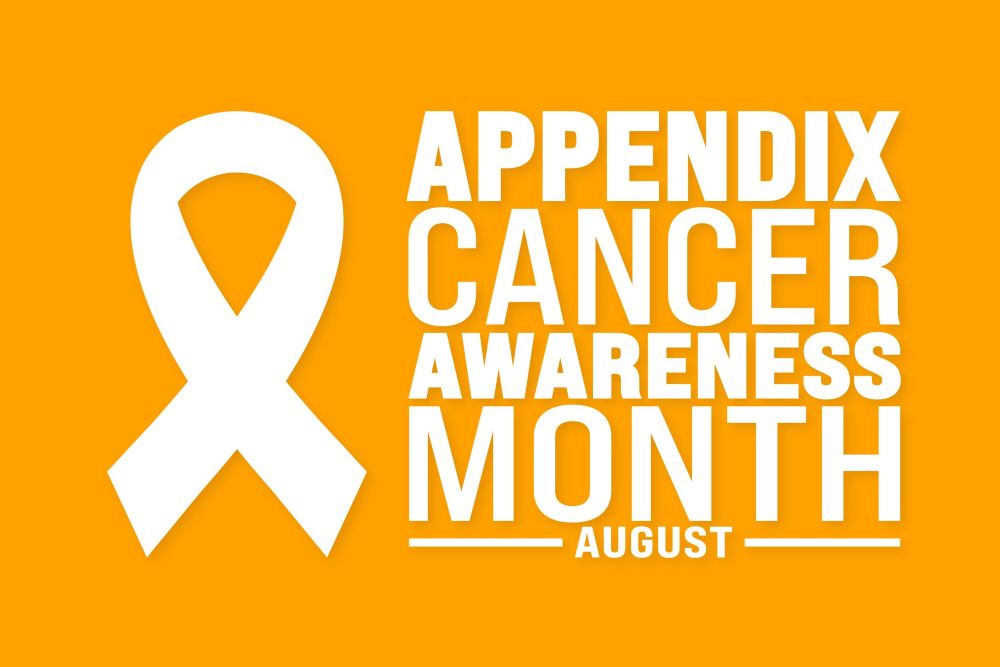
Appendix cancer is a rare type of gastrointestinal cancer with only 3,000 cases diagnosed annually in the United States. Appendix cancer is fortunately an indolent disease, with overall survival rates between 60% and 90% at five years for all subtypes and stages. Survival, however, is strongly influenced by subtype, grade and stage. Overall five-year survival is 61% for colonic-type adenocarcinoma, 55% for mucinous adenocarcinoma and 90% for appendiceal neuroendocrine tumor subtypes, respectively.1-2
Mucinous tumors of the appendix can be further subdivided into low-grade appendiceal mucinous neoplasms (LAMN) and mucinous appendiceal adenocarcinoma (MAC; low, medium and high grades). Survival for early-stage LAMN found incidentally at appendectomy is high — 97% at five years.3 Even when LAMN tumors are found with stage 4 peritoneal spread, survival can be as high as 79% with aggressive surgical resection and heated intraoperative chemotherapy (HIPEC).4 Early-stage MAC found at appendectomy also fares well at five years, with an overall survival of 70%.3 However, stage 4 disseminated peritoneal MAC has a five-year survival limited to 30% despite aggressive surgical resection and HIPEC.4
General approach to management
Low-grade appendiceal mucinous neoplasms, appendiceal adenocarcinomas and appendiceal neuroendocrine tumors each have different treatment pathways. Low-grade lesions (LAMN) do not respond well to systemic therapy and are generally treated with surgery only. They are often adequately treated with appendectomy alone.
More aggressive adenocarcinoma lesions may be offered systemic chemotherapy either before or after surgery and adequate surgical resection usually requires a right colectomy. In both low- and high-grade cases, surgical debulking (cytoreductive surgery) and HIPEC can be offered if stage 4 peritoneal spread is present.
Appendiceal neuroendocrine tumors smaller than 2 centimeters are treated with appendectomy, while larger lesions or lesions with lymph node metastasis on imaging require a right colectomy.
Because surgical therapy is central to treating these cancers, cases of peritoneal spread mandate early consultation with a surgical oncologist to help determine resectability and which surgical treatment can be offered. Indications for cytoreductive surgery (CRS) and HIPEC and the correct intraoperative execution of these cases are specialized skills certified within the complex general surgical oncology subspecialty.
Additionally, proper sequencing of systemic therapy with surgical therapy is also critical. Close coordination between medical oncology and surgical oncology providers is necessary to optimize outcomes. Below is a summary of treatment pathways for specific scenarios:
LAMN with no peritoneal spread:
- Appendectomy only.
- If imaging shows lymphadenopathy or the appendix stump margin is positive, a right colectomy is required.
LAMN with peritoneal spread:
- Evaluation for CRS and HIPEC, including CT imaging, staging laparoscopy, and in-office evaluation for surgical fitness.
- Systemic chemotherapy is usually not offered; patients proceed directly to CRS/HIPEC if candidates.
- CRS/HIPEC involves the removal of all visible disease, en bloc resection of affected organs, and heated chemotherapy perfusion.
MAC/non-mucinous with no peritoneal spread:
- Right colectomy.
- If final pathology shows lymph node spread, post-operative adjuvant colon cancer–type systemic chemotherapy is offered.
- Any signs of peritoneal spread require treatment as below.
MAC/non-mucinous with peritoneal spread:
- Evaluation by a surgical oncologist for resectability.
- Four to six cycles of aggressive curative-intent systemic chemotherapy.
- Response and resectability reassessed with CT and staging laparoscopy.
- If responding or stable and the tumor remains resectable, proceed to CRS/HIPEC followed by four to six additional cycles of adjuvant chemotherapy.
- If the disease progresses, second-line chemotherapy may be tried. Continued progression warrants palliative systemic chemotherapy.
Adjuvant postoperative treatment
LAMNs respond poorly to systemic chemotherapy, so there is typically no role for additional chemotherapy following resection of localized disease. Similarly, LAMNs with peritoneal spread are best treated with CRS/HIPEC; systemic chemotherapy again has no documented role.
For MACs, while the data are limited and primarily extrapolated from colon cancer, most node-positive cases are treated with a three- to six-month course of adjuvant chemotherapy with fluorouracil and oxaliplatin. Patients with peritoneal disease may also receive chemotherapy after CRS/HIPEC.
Neoadjuvant preoperative systemic treatment
Theoretically, preoperative systemic chemotherapy could decrease tumor burden and surgical complications. In LAMNs, however, limited case series have shown no significant benefit to pre-operative therapy, and delaying CRS/HIPEC worsens outcomes.
For MACs, a trial of systemic chemotherapy before CRS/HIPEC is reasonable, though there is a lack of randomized data supporting this approach.
Palliative systemic chemotherapy
Repeated surgery (i.e., cytoreduction) remains the primary approach for recurrent LAMNs with peritoneal disease. Systemic therapy has limited benefit but may be considered if surgical options have been exhausted. In these cases, results have been heterogeneous, but systemic therapy is a reasonable approach to consider given the lack of other effective options.
While systemic chemotherapy for metastatic/unresectable MAC has not been specifically studied in large series, colon cancer regimens such as FOLFOX or FOLFIRI with or without bevacizumab or cetuximab are generally used. Higher-grade adenocarcinomas are more likely to respond than lower-grade disease.
Conclusion
Appendiceal cancer is rare but can have a favorable prognosis if diagnosed early and treated aggressively. It is important to consult a surgical oncologist early to help with both decision-making and coordinating any future additional surgical management. Systemic therapy is key for moderate- and high-grade lesions with lymph node or peritoneal spread. Early coordinated care between surgical and medical oncology can optimize outcomes.
Learn more about treatment available for appendix cancer at Northside.
References:
- Wang, Dongyu, Huijun Ge, Yudi Lu and Xiaobo Gong. “Incidence Trends and Survival Analysis of Appendiceal Tumors in the United States: Primarily Changes in Appendiceal Neuroendocrine Tumors.” PLoS One 18, no. 11 (November 13, 2023): e0294153. https://doi.org/10.1371/journal.pone.0294153.
- Wang, Dongyu, Huijun Ge, Yudi Lu and Xiaobo Gong. “Incidence Trends and Survival Analysis of Appendiceal Tumors in the United States: Primarily Changes in Appendiceal Neuroendocrine Tumors.” PLoS One 18, no. 11 (November 13, 2023): e0294153. https://doi.org/10.1371/journal.pone.0294153.
- Boström, Linda, Vuk Jovic, Malin Dahlberg et al. “Survival among 148 Patients with an Incidentally Detected Appendiceal Tumour at Surgery for Acute Appendicitis: A Population-Based Cohort Follow-Up Study.” European Journal of Trauma and Emergency Surgery 50 (2024): 2113–22. https://doi.org/10.1007/s00068-024-02580-1.
- Han, Zhi, Xuan Liu, Yuming Tian et al. “Long Term Survival Outcomes of Surgery Combined with Hyperthermic Intraperitoneal Chemotherapy for Perforated Low-Grade Appendiceal Mucinous Neoplasms: A Multicenter Retrospective Study.” World Journal of Surgery 48, no. 1 (January 2024): 86–96. https://doi.org/10.1002/wjs.12018.


